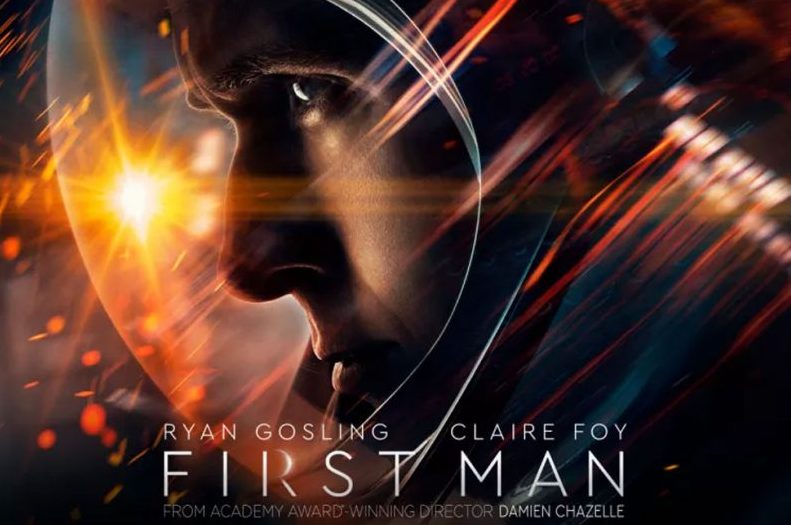Cadenza | Film | Pranaya's Picks
Pranaya’s Picks: ‘First Man’
Damien Chazelle is a traditionalist. He is also not a traditionalist. He is fantastically ambiguous. As a film viewer, his ambiguity delights; as a film reviewer, it frustrates. His works are curiosities, wonderful to experience but difficult to accurately and precisely describe. “First Man”, Chazelle’s latest effort, is his most extreme film yet. It’s his most traditional and nontraditional; his most exciting and most frustrating. “First Man” is Damien Chazelle’s worst film so far, but it also contains some of his best work as a director. For Chazelle, “First Man” is a small step for his filmography and a giant leap for his evolution as a filmmaker.
“First Man” explores an eventful and transformative decade in Neil Armstrong’s life. In 10 years, he advances from an engineer to a pilot to an astronaut, he loses his closest friends and he loses his daughter. At the end of the decade, he walks on the moon. Screenwriter Josh Singer asks why Armstrong, a modest family man typically indifferent to the glamor of the spotlight shot himself out of the atmosphere in what amounted to a death trap.
Ryan Gosling channels Armstrong with phenomenal poise. His performance is restrained and believable. Chazelle and Singer focus on Armstrong’s emotional incoherence and inarticulateness. Gosling captures Armstrong’s inability to communicate with nervous fidgeting and resigned eyes. The film is strongest when he is on screen. Two scenes are particularly noteworthy; in one, he reluctantly speaks to his family before embarking on his mission to walk on the moon; in the other, the film’s final scene, he reunites with his wife in quarantine. Both scenes are well-crafted and perfectly performed, lit and framed. Armstrong is isolated and lost, more comfortable miles above Earth than on it.
For much of the film, Gosling is accompanied on screen by Claire Foy, who plays Janet Shearon, Armstrong’s first wife. Her performance is also stellar, but her character is underdeveloped. When Armstrong is not home, he is frequently with other NASA astronauts and engineers including Ed White (Jason Clarke), Deke Slayton (Kyle Chandler), Buzz Aldrin (Corey Stoll) and Elliot See (Patrick Fugit). The ensemble is strong but never feels essential.
The problem with “First Man” is that it feels like two films: a historic thriller on the moon mission and a quiet family drama. Both stories are powerful and well-made, but Chazelle fails to integrate them into one cohesive film. The final product feels unfinished.
Chazelle makes films about characters who chase and achieve success after great sacrifice. He creates classic American stories about love and ambition. His first two films, “Whiplash” and “La La Land” tell these stories more coherently than “First Man”, but “First Man” has a richer story to tell. It complicates a tale of American triumph and reimagines how we see the space program completely. When “First Man” works, it is a sight to behold.

The beginning of the film, for example, is stunning. The opening space flight is nerve-wracking, claustrophobic and unsettling. The audience experiences space as Armstrong did, primarily through a window and a complicated set of controls. Every shot is either in the space shuttle or on it. The scene is not silent and long; the shots are not wide or deep. The opening moments are loud, edited quickly and shot in a succession of shaky, selectively focused close-ups. When the mission succeeds, the question is not how it succeeded, but how it did not fail.
Danger defines the space program. Every shot and scene in a space shuttle is breathless, every silent moment before a launch full of dread.
At times, “First Man” is truly great. The opening sequence, the conversation before Apollo 11, the final scene, all moments discussed in this review, are just a few of many examples. The film just does not fully connect. Some storylines are ineffective, and others are better without being entirely developed. The film is left feeling incomplete.
Ultimately, I still recommend “First Man” and believe it is a good film—its only real drawback is that it could have been great.
In “First Man”, Damien Chazelle makes a lot of mistakes—some silly (a truly meaningless and showy 2001 Space Odyssey homage) and some more seriously compromising (Claire Foy deserved a lot more screen time). In the end, though, he solidifies his position as one of the most interesting filmmakers alive. His shooting style and ambition remain exciting. His story decisions and theme developments are more mature. Chazelle shot for the moon and missed ever so slightly. I am watching to see what he does next.
